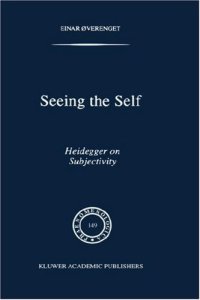
Ebook: Seeing the Self: Heidegger on Subjectivity
Author: Einar Øverenget (auth.)
- Tags: Phenomenology, Ontology, Modern Philosophy, Metaphysics
- Series: Phaenomenologica 149
- Year: 1998
- Publisher: Springer Netherlands
- Edition: 1
- Language: English
- djvu
" . . . die Augen hat mir Husserl eingesetzt. ,,1 he aim of Twentieth century phenomenology is to provide a non T psychologistic interpretation of subjectivity. Husserl agrees with Frege; to adopt psychologism is to give up truth. But this should not prevent us from investigating the subjective perspective. On the contrary, Husserl thinks that an appropriate rejection of psychologism must be able to show how propositions are correlated to and grounded in subjective intuitions without thereby reducing them to psychological phenomena. Obviously this calls for an interpretation of subjectivity that makes a sharp distinction between the subjective perspective and the psychological realm. Phenomenology is devoted to the development of a notion of subjectivity that is in accordance with our experience of the world. A fundamental tenet of phenomenology is that philosophy should not dispute this experience but rather account for it. Hence, phenomenology must avoid a notion of subjectivity in which it becomes a problem to account for how a subject can ever hook up with the world. In other words, a phenomenological interpretation of subjectivity must radically disassociate itself from what is often referred to as a worldless, Cartesian subject, a res cogitans. But neither can an interpretation of SUbjectivity consistently advocate a position according to which the human order is described only in the categories appropriate to the physical order. Such an interpretation is obviously not compatible with the phenomenal basis for undertaking this very interpretation, that is, our experience of the world.
This study examines the concept of subjectivity developed by Heidegger in his Marburg period and which found its most systematic presentation in Being and Time. Although it is commonly argued that Heidegger's existential analytic seeks to do away with subjectivity, I shall maintain that this analysis does not intend to eliminate subjectivity as such but rather one notion of subjectivity. Heidegger challenges the interpretation of the subject as a worldless and thing-like entity by introducing an interpretation according to which subjectivity is a being-in-the-world that is not a thing. Central to this study is Heidegger's use of Husserl's theory of wholes and parts and the concept of categorial intuition. These Husserlian themes are amalgamated into a phenomenological sense of the apriori which is the foundation for Heidegger's analysis of Dasein. This approach will show that Heidegger's existential analytic is a systematic argument geared toward the development of a phenomenological notion of subjectivity.